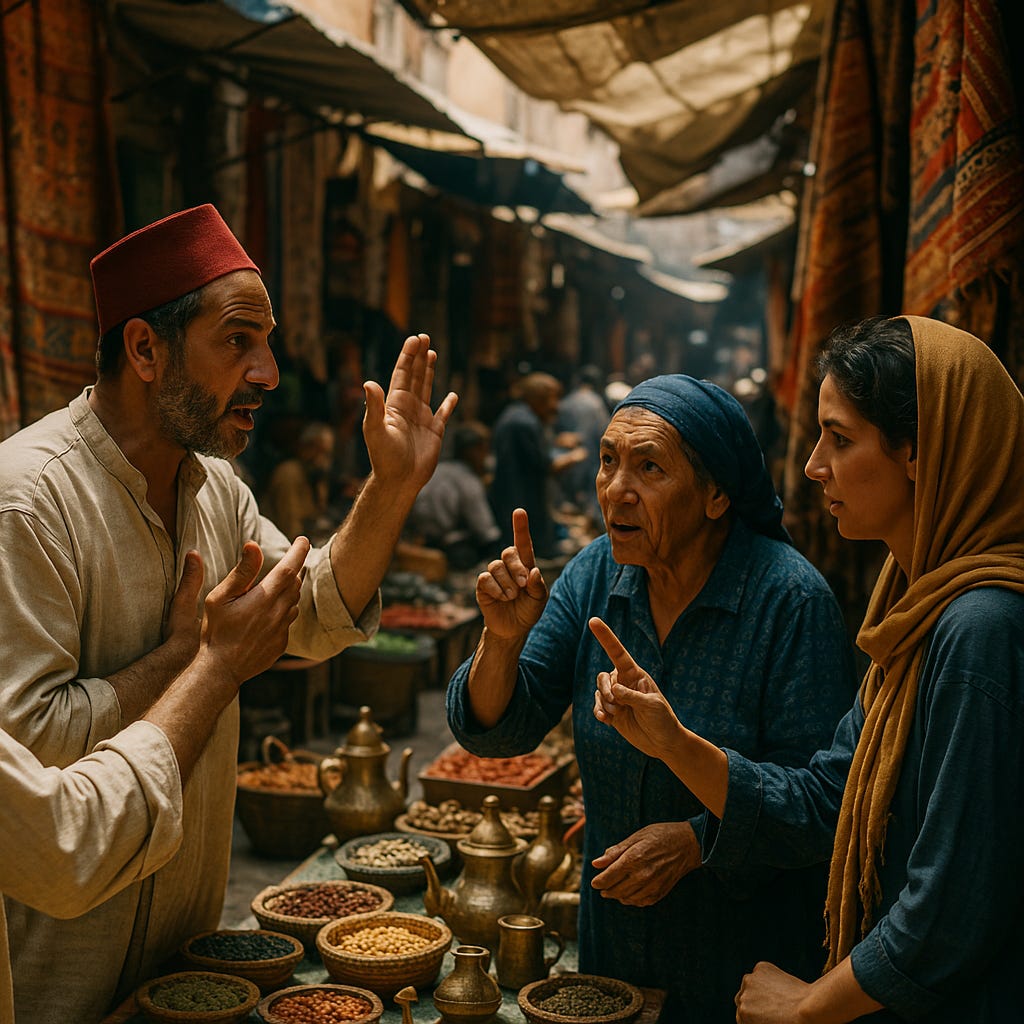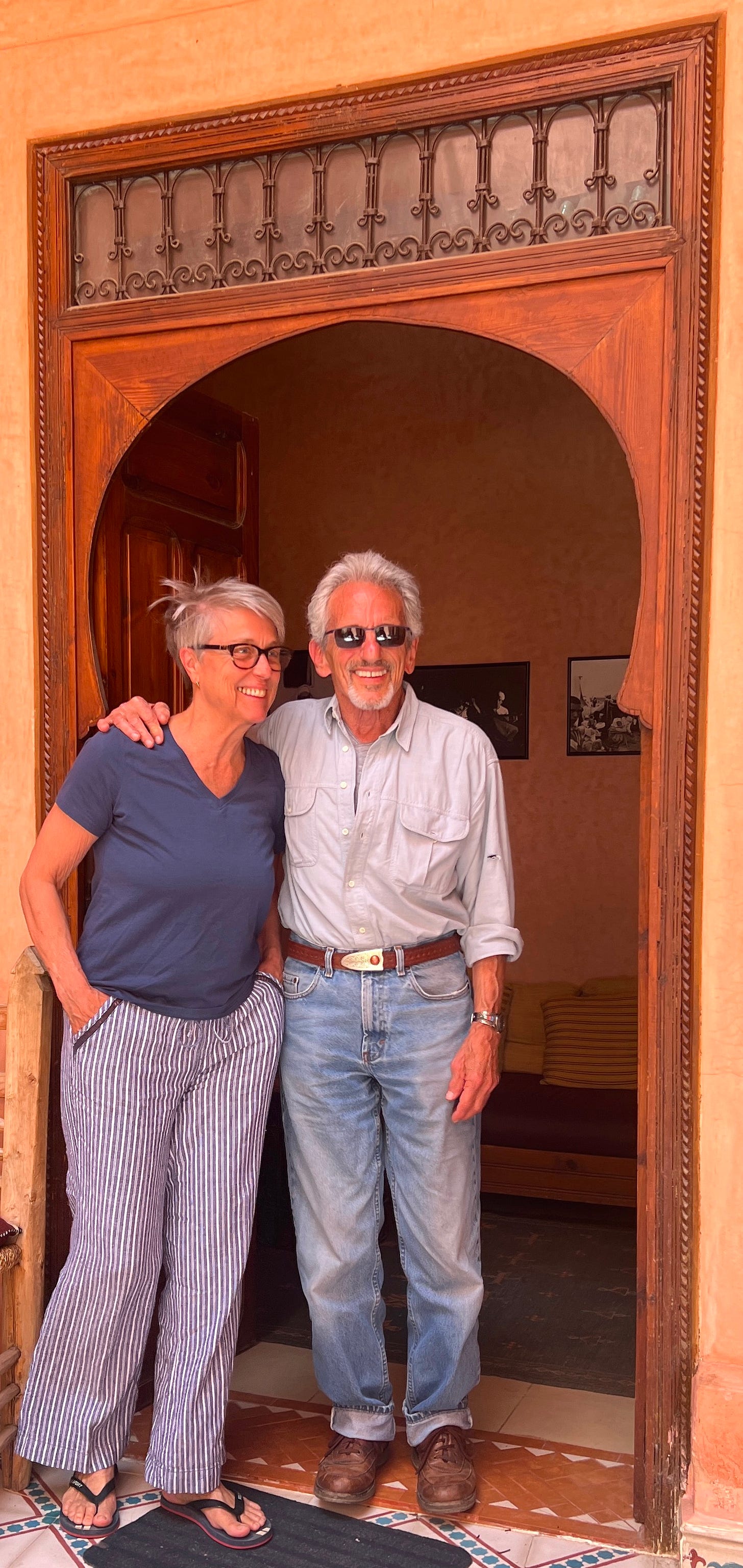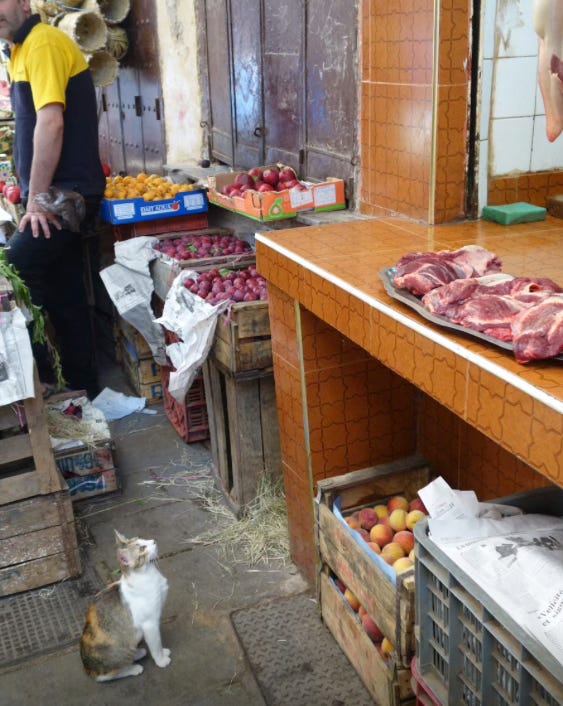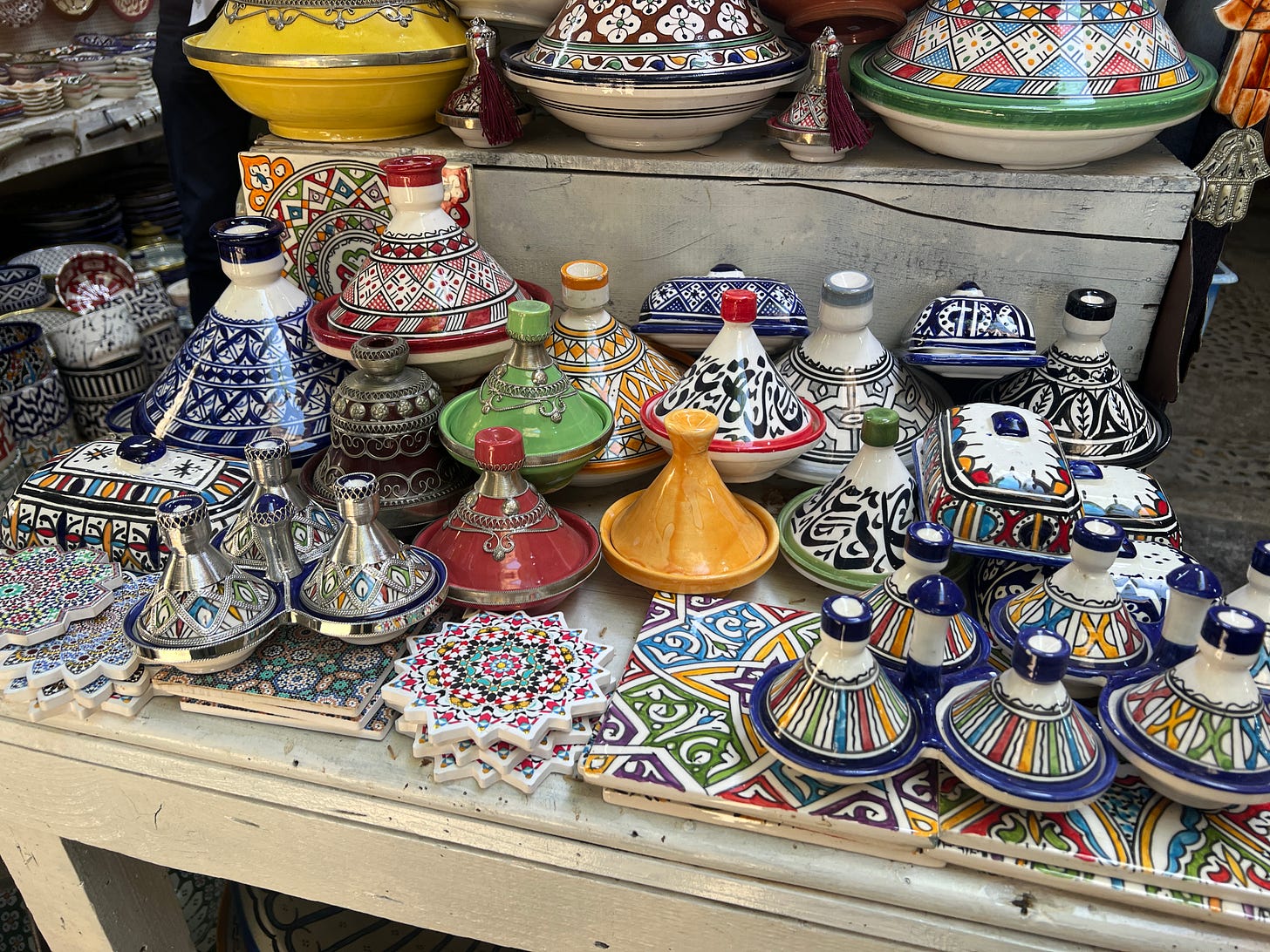At some point—maybe after your third blistering cup of mint tea or your seventh psychodrama over a Berber rug—the border between Morocco and your mind melts. The souk is no longer a market; it’s a hallucination stitched from goat bells, sandalwood smoke, and the echo of ancient bargaining chants. You’re no longer a tourist. You’re a character in a bazaar-shaped dreamscape, staggering through alleyways that rearrange themselves like a living maze. Every vendor wears the grin of a trickster god, fluent in twelve languages of seduction and economic sorcery, while you negotiate with dirhams and doubt, a wide-eyed freshman in an econ class run by Dali and Scheherazade.
Let me rewind.
We have some dear friends from Tucson, Joel and Cinde Rubiner, who own a riad in Marrakech—an absolutely enchanting little oasis tucked away behind a wooden door you’d never notice unless you knew exactly where to look. They’d been inviting us to Morocco for a while, and last week, we finally took them up on it.
We came in cold: no guidebook, no game plan, and utterly unarmed for the Darwinian drama that is Moroccan bargaining—a sport where charm, wit, and mild deception collide under a tarp. Thankfully, our friends took us under their wing for the first couple of days, showing us the ropes: how to haggle without offending, how to spot a tourist trap, how to accept mint tea whether you want it or not.
After that soft landing, we were on our own for a full week in Marrakech, followed by a mind-bending detour to the ancient city of Fez, and then a final coastal exhale in Essaouira.
What follows is a compendium of my bartering adventures over the past few weeks—a blend of triumph, humiliation, and hard-won wisdom from the Moroccan marketplace.
In the Kingdom of the Deal
One morning, several days into the trip, I found myself blinking in the thick, cumin-scented haze of Jemaa el-Fnaa, the legendary central square. Snake charmers, donkey carts, toothless grins, motorbikes, and henna artists coming at me with all the subtlety of a mugging.
It was beautiful. Chaotic. Biblical.
And from the second I opened my mouth, I learned the one unshakable truth about Morocco: nothing has a fixed price.
“Where you from, my brother?” a man in a kaftan asked, arm already around my shoulder. “Ahh, America! Big welcome. Come see my shop. No pressure. Just looking. Like museum.”
Three hours later, I was the disoriented owner of a miniature tagine, a silver bracelet I didn’t remember buying, and what may or may not have been a camel-hair rug. I wasn’t sure how it happened. But I had been… souqed.
You don’t buy things in Morocco. You negotiate your destiny.
Bartering in Morocco is part theatre, part philosophy, part blood sport. Every interaction is laced with smiles, exaggerated sighs, and the eternal chorus of:
“For you, my friend, today only, special price. Best quality.”
It’s not just about haggling—it’s a social ritual. And the more I got into it, the more I realized that Morocco wasn’t just good at trade—it was built on it.
A Land Forged by Trade Routes and Survival
Long before Zara opened a store in Casablanca, Morocco was already a powerhouse of commerce. Its entire geography screams middleman hustle. Between the Mediterranean and the Atlantic, perched like a lizard between Europe and the Sahara, Morocco has always been a gateway.
In ancient times, Moroccan Berbers ran vast camel caravans across the Sahara, ferrying salt, gold, spices, and sometimes human cargo between Timbuktu and Tangier. The Tuareg and Sanhaja tribes became living legends—navigating shifting dunes like Wall Street traders with turbans.
Fez and Marrakesh weren’t just pretty cities with tiled fountains and fountains of tile—they were hubs, nodes in a trade network stretching from Cairo to Granada.
Later, the Islamic Golden Age turned commerce into a sacred duty. Markets exploded. Philosophers debated ethics of trade alongside theology. Goods flowed, ideas flew. Morocco became a land where a man might recite poetry while selling apricots.
And then came the French and Spanish protectorates—installing bureaucracy and rails, but also forcing Moroccans to adapt once again. And adapt they did.
Because here’s the thing about Moroccans:
They will sell you anything. With grace. With soul. With Jedi-level mind tricks.
And if they don’t sell it to you today, they’ll sell it to your cousin tomorrow.
The Economy of Now
Fast forward to today. Morocco’s economy is still deeply tied to trade. Yes, there are factories and banks and cryptocurrency bros in Casablanca now, but in the medinas and mountains, barter remains king. Not out of nostalgia—but out of practicality and pride.
You’ll still find:
Farmers swapping sheep for olive oil
Artisans trading handmade shoes for a satellite dish
Urban vendors negotiating prices with French tourists like they’re splitting the spoils of war
Bartering, it turns out, is more than economics—it’s a preservation of identity. A refusal to let algorithms replace eye contact.
The Morality Play of the Souk
After about a week in Morocco, I had fully surrendered to the system. No price tags. No shame. I went full native. I learned to:
Laugh before I countered.
Walk away slowly, knowing full well I’d be called back.
Accept the mint tea, always.
Treat every transaction as a kind of flirtation.
But nothing could have prepared me for Abdel the Astute.
Let me introduce you to a man who makes capitalism look like amateur hour.
Abdel is a walking legend in the Marrakesh medina. Sixty, maybe seventy, wiry like a jazz bassist. He ran a rug stall the size of a closet but stacked to the ceiling like a magician’s library—wool, camel hair, silk, goat, dreams.
He saw me before I saw him.
“You are a man of taste,” he said, smiling like a jackal in a dinner jacket. “Come in. No buy. Just look. Like museum. Only difference: I talk.”
I should have run. I should have faked a phone call. I should have said I was Canadian.
Instead, I smiled back.
Abdel showed me rugs like they were lost Gospels. Each one had a story. “This one? My aunt’s cousin wove this during a thunderstorm in Azilal. The lightning gave it spirit.”
He asked for 3,000 dirhams. I countered with 500. He clutched his chest. We broke for tea. He asked about my life, my dreams. We haggled some more. He threw in a pillowcase and a curse on Amazon. I threatened to walk. He blessed my mother. I countered with my grandmother’s chicken recipe.
Hours passed. Time bent.
Finally, we landed on a number. A handshake. A pact.
And then—he smiled wider.
“You give me 600 dirhams… and your sunglasses.”
“Why, you’re already wearing your own pair?” I wondered.
He shrugged. “Then I see the world through your eyes.”
Ok, so I gave him the damn glasses.
As I stumbled away with my rolled-up rug and new sense of identity, I turned to see Abdel already putting my glasses on a bust of a goat and calling over another tourist. “Welcome! You look like a man of vision!”
“The Djellaba Debacle: A Tale of Threads, Lies, and Slight Humiliation”
It was my fourth day in Fez, and I was feeling… local. Maybe it was the couscous. Maybe it was the fact that I could now cross a street without flinching at the death ballet of scooters and donkeys. But mostly, it was the confidence that came with owning a rug, three lanterns, two embroidered pillowcases, and the kind of intestinal fortitude that can only come from eating street tagine.
And so, like any self-respecting newly-minted pseudo-Moroccan, I decided I needed a djellaba.
Not just any djellaba. The djellaba. One that would say, “Yes, I read Camus but also smoke hash behind sand dunes with men named Rachid.” One that would look great on Instagram but also make me spiritually aerodynamic.
I was going to post a picture of my new djellaba, but I had a brief and terrifying vision of some TSA analyst clicking “flag for review,” and the next time I try to fly, I’m blindfolded and shackled on a rendition flight to Guantánamo. All because I looked too comfortable in North African cotton.
So I made my way to a stall wedged between a leather tannery and a guy selling antique dental equipment. A djellaba hung in the breeze like a wizard’s robe, whispering promises.
From the shadows emerged Hamid—a man with who could sell bitcoin to a Bedouin. He eyed me like a hyena who just spotted a wounded zebra wearing a Lonely Planet neck pouch.
“You have good taste,” he said, before I said anything. “This one, handmade. Wool. Berber. Ancestral. Feels like wearing the soul of the Atlas Mountains.”
I slipped it on.
And I’ll admit it—I felt powerful. Mystical. Like I could dispense ancient wisdom and breakdance at a drum circle. I asked the price.
“For you,” Hamid whispered, “just 950 dirhams.”
I laughed like an old movie villain. “My friend,” I said, “I’ll give you 200.”
Hamid looked pained, as if I’d just insulted his mother, his goat, and his entire lineage. “Brother! This wool is not from sheep. This wool is from heaven!”
We sparred for twenty minutes. Offers. Counter-offers. An unsolicited lecture on the textile industry. At one point, he brought out his cousin who claimed to be a tailor. At another, I swore on the life of my dead cat that I couldn’t go above 300.
Eventually, after tea, more drama, and what felt like a hostage negotiation, we landed on 450 dirhams. A gentleman’s agreement.
I walked out triumphant, the djellaba billowing behind me, people smiling as I passed. I was no longer a tourist. I was The Wise One from the West.
Until…
An old man sitting on a stoop called out in Arabic. I turned. He motioned me over with the slow hand of doom.
“Nice djellaba,” he said in broken English. “You pay how much?”
I puffed up. “450.”
He burst into laughter. Not polite chuckles. Deep, soul-wracking laughter, like I’d just farted in a mosque.
“This?” he said, tugging at the sleeve, “polyester. From Tangier. Maybe 100 dirhams. Maybe.”
My pride shriveled like a fig in the sun. I had not bought the soul of the Atlas Mountains. I had bought a sweaty, synthetic bathrobe.
He patted my shoulder, still giggling. “But you wear it good. You have Moroccan face.”
Which I think was a compliment.
In Morocco, you never really buy the thing. You buy the story. You buy the interaction. You buy the moment. Sometimes you win, sometimes you lose, but either way—you’ve danced the ancient dance of the deal.
What I realized on that trip—somewhere between the bargaining, the Berber tea, and the dust in my ears—is that bartering isn’t about winning. It’s about connection. It’s about ritual. It’s about recognizing someone else’s hustle and meeting them halfway.
In a world run by invisible transactions, silent clicks, and soulless interfaces, Morocco is a reminder that trade can still be intimate, improvised, and hilariously human.
So the next time you visit, don’t be shy. Step into the dance. Channel your inner hustler. Sip the tea. Tell a story. Offer less than half. Walk away. Come back. And above all—never wear sunglasses you’re not willing to lose.
More about the People of Morocco, next week. I’m still processing the trip.
—-
Until we meet again, let your conscience be your guide.









A lesson in life--it's not important to win, but it's great to connect with another human, especially if you can help him somehow.
what a treasure you are my friend!!!! Marvelous essay thank you..!